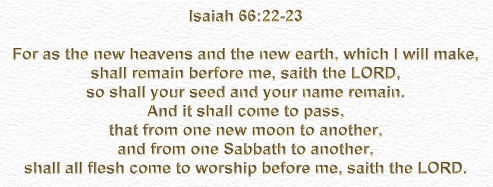



| Exodus 12: | 1: And the LORD spake unto Moses and Aaron in the
land of Egypt, saying, 2: This month shall be unto you the
beginning of months: it shall be the first month of the year to
you. |
| Exodus 14: | 3: And Moses said unto the people, Remember this day, in which ye came out from Egypt, out of the house of bondage; for by strength of hand the LORD brought you out from this place: there shall no leavened bread be eaten. 4: This day came ye out in the month Abib. |
The name of the Exodus month is Abib. The word Abib means 'sprouting, budding', a 'green ear of corn'. In other words, in Abib the earth will spring to life, plants will sprout and bud and the corn ( sown the previous year ) will have green ears. The first month is also called Nisan. ( Esther 3:7 )
"Abib most nearly approaches our month of March, though in some years its end moves some distance into April." ( Westminster Dictionary of the Bible. page 3, article Abib )
In ancient days, before the exact equinox times were known or calendars printed in advance, the Sanhedrin selected Abib's new moon on the basis of certain natural conditions because Yahweh's Feasts are directly linked to the agricultural seasons in Israel.
THE NATURAL CONDITIONS looked for were:
In modern times Abib's new moon is selected months and even years in advance mainly because computer calculations of the sun's and moon's movements are widely available and there is no Sanhedrin to give the go-ahead as in days gone by. The scriptural guidelines concerning the link between the Feasts of the Most High and the harvests in Israel are, nevertheless, still being followed. They are:
1. Abib's new moon must occur before the spring harvest begins.
| Deuteronomy 16: | 9: Seven weeks shalt thou number unto thee: begin
to number the seven weeks from such time as thou beginnest to
put the sickle to the corn. |
This instruction concerns the waive sheaf which is cut and waived before Yahweh at the Passover festival in the middle of Abib. Since the spring harvest in Israel begins in late March/early April ( see agricultural chart under Question/Answer 4 ) this means that the 1st of Abib would begin some 15 days before the waive sheaf was cut; which means that Abib's new moon would occur at about the time of the vernal equinox. The Westminster Dictionary of the Bible article Year confirms this:
2. Ethanim's new moon occurs after the autumn harvest.
The second clue fixes the festival of Ingathering ( Tabernacles )
at the 'end' of the agricultural year. Here is the Almighty's
command concerning the feast of ingathering ( Tabernacles ).
| Exodus 34: | 22: And thou shalt observe the feast of weeks, of
the firstfruits of wheat harvest, and the feast of ingathering
at the year's end. |
The Hebrew word translated "year's end" is t@quwphah or "tequphah." It means at the end, the circuit of time, the revolution, the equinox. In other words, Yahweh is here telling Israel that the Feast of Tabernacles should occur at about the time of the autumnal equinox, when the agricultural year is at its end. This is a vital clue because it links the harvest festival of Tabernacles to the autumnal equinox. A look at the agricultural scene in Israel will reveal that the harvests are mostly gathered in before the tequphah - the equinox. In fact, the main ( wheat ) harvest begins in the summer months of May and June and is finished by August. The vintage ( grape harvest ) follows and is normally finished by the autumnal equinox. This is when Yahweh commanded Israel to keep the harvest festival of Tabernacles; at the 'end' or the turn of the year when the harvests are gathered in. For more information concerning Harvest Times in Israel see the answer to Question 4.
In summary, we may say that in a pre-printed calendar, the first and seventh months of the year should still be geared to the agricultural harvests in Israel; the first month Abib, the month of green ears, starting about 15 days before the barley harvest is begun; and the seventh month ( Ethanim/Tishri ) starting after the vintage is gathered in. By starting Abib with the new moon nearest ( before or after ) the spring equinox, these two divine requirements are met.
Notes
Always bear in mind, of course, that in ancient Israel the calendar was not published in advance. The choice of Abib's new moon depended on those 'natural conditions' mentioned previously. Equinox times and phases of the moon calculations are simply a convenient forecasting facility, which allow us to keep in step with the seasons - and hence the harvests - in Israel.
A Voice In The Wilderness Calendar Page The Almighty's Feast Days